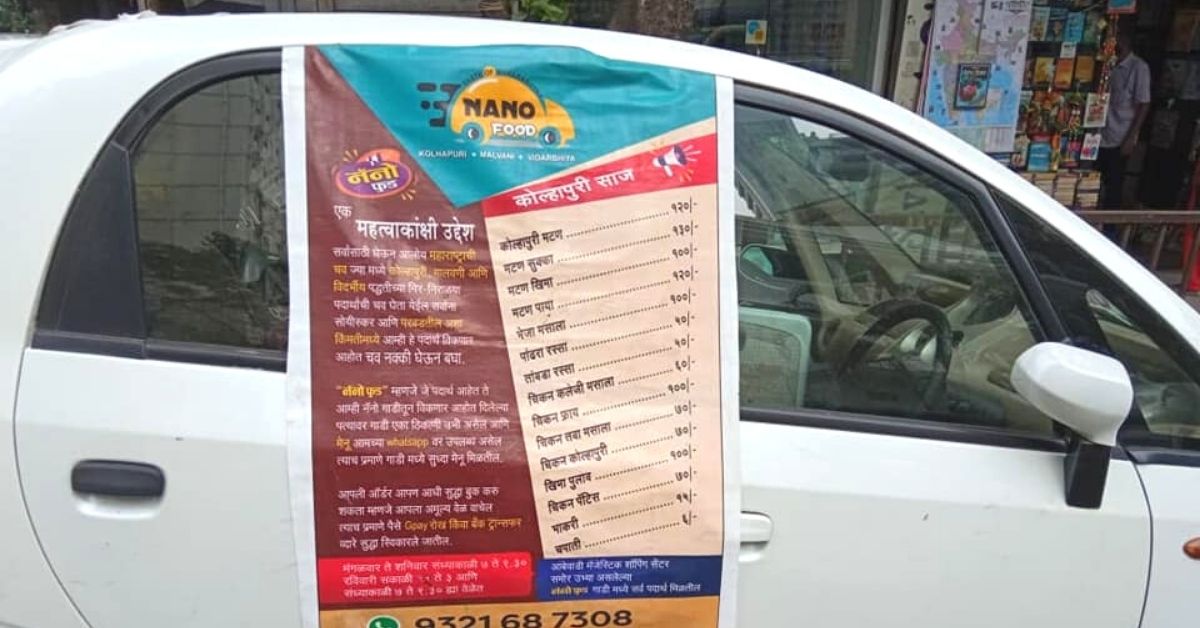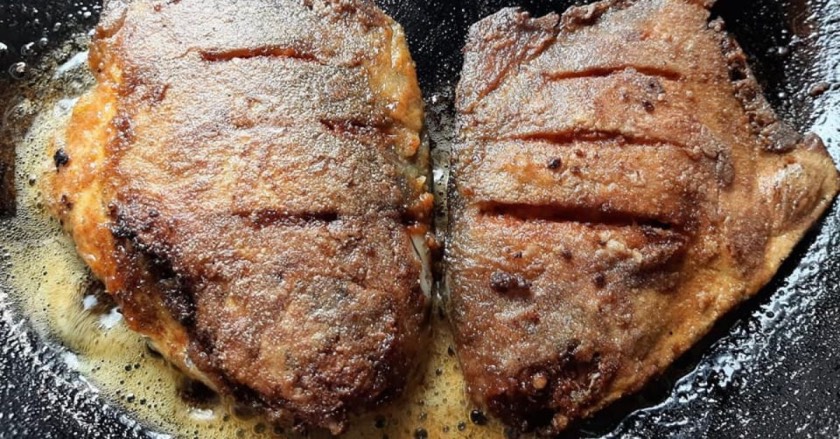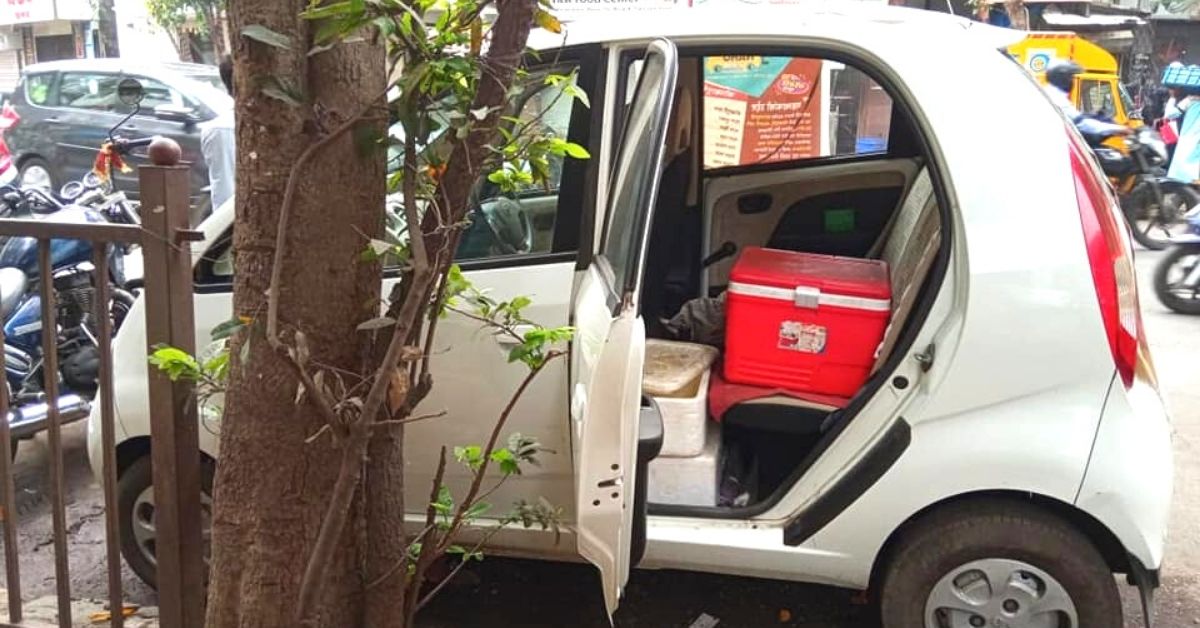If you happen to pass through Ambewadi Chawl at Charni Road in Mumbai, you are likely to spot a Tata Nano parked on the road. This vehicle is peculiar, with the aroma of freshly-cooked seafood wafting from the car. It’s unlikely that you’ll miss it, as the white car also has a long poster that boasts of delicacies made by a five-star hotel chef.
Pankaj Nerurkar from Girgaon worked in the hospitality industry for two decades. After gaining experience as a chef with Grand Hyatt and an international cruise, as well as that of brand chef at The Irish House, he started Khadpe’s, a Malvani cuisine restaurant, in 2017.
The blow of the economic crisis by the COVID-19 pandemic did not spare Pankaj either. The financial losses brought services at two of his restaurants at Prabhadevi to a sudden halt.
But the pandemic had quashed his business, not his dream. The 43-year-old picked up the broken pieces and began selling authentic Maharashtrian seafood cuisine from his Nano and earning Rs 1 lakh a month.
Hitting rock bottom

“I started my restaurant in 2017 and invested all my life savings and my wife Dipti’s jewellery. Everything was going smoothly, so I opened a second outlet in late 2019. However, the pandemic forced the business to close,” Pankaj says. As business stood still for months, he could no longer afford to pay his rent and overheads. “I had hit rock bottom, and negative thoughts began creeping in my mind,” he adds.
Pankaj says that as the lockdown eased, he and his wife started thinking of ideas to get back into the business. “My brother had also lost his job. I had a father and two children to support. I had to earn an income to help my family survive,” he says, adding that since many customers already knew about his restaurants, he knew he could venture into the culinary world again.
He decided to start cooking from home and offering takeaways. “But I was used to cooking using commercial equipment and in large quantities. The home kitchen set-up seemed inadequate. Besides, customers often had to access narrow lanes of the chawl, which affected visibility and created doubts regarding hygiene. There was a need for increasing my new business’ visibility,” he says.
Pankaj decided to cook the food and carry it in his car, outside the house on the main road. “I decided to sell takeaways to customers from the car, and named it Nano Food. I made posters and wrote down the menu on the whiteboard. We kicked off in September 2020,” he adds.
The Nano appeal

However, the business did not do well, and hardly saw five customers a day. “Disappointed by the poor response, one day, I decided not to display the menu on the car, inching towards giving up on the venture. Some time during the day, a gentleman on a two-wheeler stopped by, and asked about the absence of the menu. But as I tried to dismiss him, he told me that reading my menu was a part of his daily ritual,” he adds.
The entrepreneur realised that while there were fewer customers, he did, in fact, receive the required visibility. “I learned that the food menu was limited and that I had to widen options for potential customers. From a small menu of chicken and fish thalis, I expanded the items to malvani chicken curry, surmai fry, pomfret fry, kolambi fry, kolambi pulao, kolambi masala, chapati, bhakri, and brinjal, and received a good response,” he says.
As the word spread, more people began flocking to the car. “What appealed to the customers was that a person without money could execute a business from a small car. Visitors appreciated the business model and they made it a hit,” he says.
The business opens at 7.30 am for breakfast, 12.30 pm for lunch and 7.30 pm for dinner. It now sees around 150 customers a day.
Apart from his partner, Pankaj also received support from his college friend, Shreekrishna Gangan, during his lowest moments. “Pankaj’s dream is my dream, and I could not let it shatter at any cost. I have seen him work passionately and invest all his energy into the venture. Moral support is as important as financial assistance,” Shreekrishna says.

Despite a steady business, Pankaj says that a long road lies ahead. “I am only able to break even and feed my family. The prices of oil, fuel and other raw material have escalated. People have lost their jobs, and their spending capacity has reduced. Considering the cash crunch, I am selling the delicacies at Rs 100 and Rs 120 against their restaurant price of Rs 350. The profits are marginal, but the food is affordable to customers. The cost of cooking involved in running a seafood venture is more compared to vegetarian or other non-vegetarian entities. Dipti helped with operations of the restaurant,” he says.
Pankaj says that increasing profits will mean selling in bulk or accepting large orders. About giving up Nano Food once profits increase to take up a permanent place, Pankaj says, “I would never give up on the new business model, as it has helped us get back on our feet.”
He adds, “On the other hand, I am planning to replicate the model in commercial and residential areas of Mumbai.”
Edited by Divya Sethu
No comments:
Post a Comment